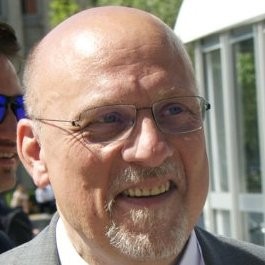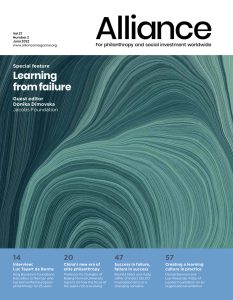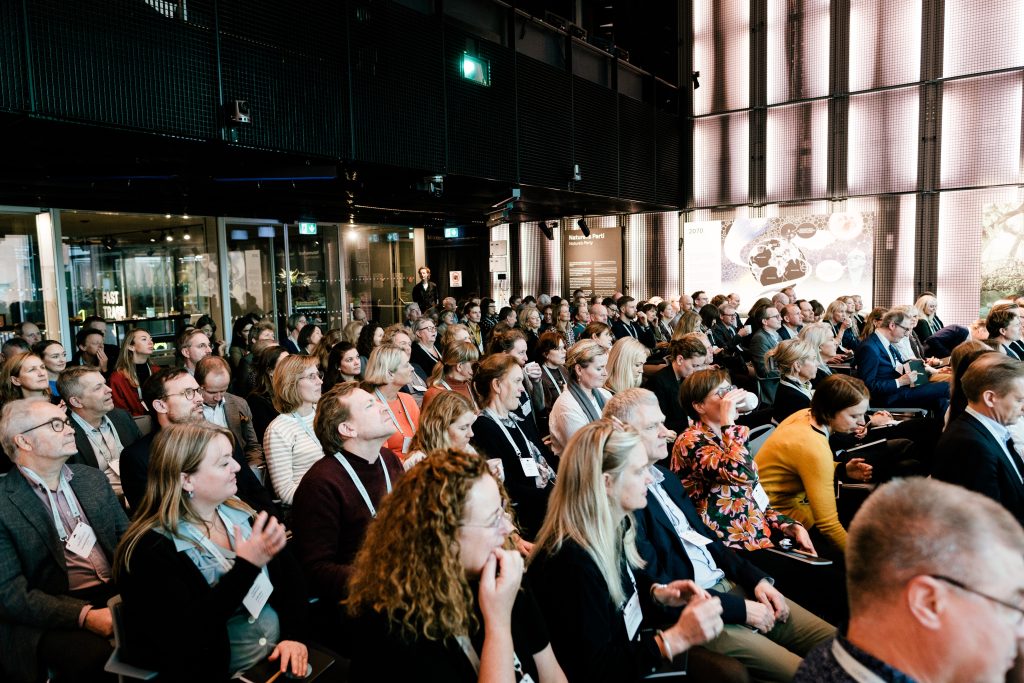Jesper Nygård is CEO of the Danish foundation, Realdania and chair of the Danish Foundation Knowledge Centre. He is also a long-time advocate of collaboration within and between the sectors.
At the recent Nordic Foundations Conference in Copenhagen, he spoke to Alliance about the common ground shared by the Nordic countries, about the potential for foundations to set an example and about the importance of their owning and learning from their failures.
Andrew Milner: The tagline to this conference is stepping up on ESG, igniting the potential. What is that potential?

Jesper Nygård, CEO of the Danish foundation, Realdania and chair of the Danish Foundation Knowledge Centre
Jesper Nygård: There’s an immense potential. We have to take bigger risks than the rest of society. We have to lead by example. So there’s a big obligation for us with the environment, with society and with governance to set good examples and to work together with civil society, government and business and help to create other returns on investment than just material ones. We should be active on this agenda.
Are you also talking about advocacy when you talk about setting an example to the other sectors?
I’m talking not so much about advocacy because only some foundations have the legitimacy to work with advocacy but all foundations and philanthropic associations have the legitimacy to do concrete projects, to do research, to show by example and that’s another way of changing a mindset. Most foundations in Denmark would be a little soft on advocacy and do it by example instead, by providing knowledge, doing research, and helping the private and public sectors to stand on firm ground in what they are doing.
So it’s not just about thought leadership, but also through your grantmaking?
Exactly. And then bringing the Nordic foundations together. At the EFC conference, several years ago, the Nordic foundations met over lunch and said: shouldn’t we, in our part of the world, also do something which is more our own context than the big European context and that was the motive for hosting a conference like this.
The Nordic Foundations conference is based on the idea that it’s easier and it makes sense to share knowledge between Nordic countries because they’re more alike. Is that the case? Do you see a particular niche for Nordic foundations?
There’s a lot of history in common between especially Norway, Sweden and Denmark, but also the whole Nordic region, though there’s not a specific common foundation history and we have different regulations and different approaches, so for us, it’s important to work together in Europe, with Philea, but also to stay in our context. This part of the world has higher trust than most others. All of the countries have higher tax and a strong welfare state. So we have a lot in common, and that knowledge could be shared. That’s not to say, of course, that we don’t want to work with Europe, because that’s also important, or with the United States who are the front runners in most philanthropic work.
How do you mesh this specifically North European attitude to society, if you like, with the rest of Europe? What can you tell them and what can they tell you do you think?
I think some of the inspiration that can come from the north is that by working together, you can create bigger results than working separately. In different parts of the world, I have experienced a lack of cooperation between the philanthropic sector and the public sector. Maybe it has to do with a lower level of trust in each other and between the sectors. In several countries, a lot of philanthropic activity is instead of the public sector. In the Nordic countries, philanthropy often stands on the shoulders of the public service structures and society, so this is about trust, working together, believing in each other, trying to co-create things instead of doing them in individual sectors. I think we have very good examples that are worth looking at.
Collaboration has now become a buzzword in philanthropy, but well before you started to work in the sector, you were advocating it. What was it that led you to see the potential for it before most people were talking about it?
I was CEO for the biggest Danish non-profit, social housing company for seventeen and a half years, and what I saw was that when we cooperate across civil society, the public sector and the private sector, two plus two were not only five instead of four, but seven or eight because it added so much value. And my experience taught me that if you come from one of the sectors and you don’t have a deep knowledge of how the other sectors work, then you miss a lot of potential. For example, I worked for a civil society organisation. If I don’t spend time trying to understand how the public sector works, what kind of capital they deploy, etc, I’m failing to understand another piece of the puzzle and how it could fit together with mine. And in the same way, if I don’t put time into understanding how the private sector works then I miss potential opportunities there. But if I do take the time, I realise that the public sector has extremely high professionalism, the private sector has a huge resource of innovation, the ability to have an idea and see it through to a product on the shelf. The public sector is not good at that. Civil Society is not good at that. The foundation’s perspective is maybe a generation, the politician’s perspective is three or four years to the next election, the private sector’s immediate economical perspective is often maybe the stock rating tomorrow or the next quarterly financial reporting. If you combine those perspectives and you understand how these three sectors work, and you show respect for each other, then all of a sudden, you can create ESG, you can create sustainability because you learn from each other. That’s what I saw in my everyday work. It has really changed my own mindset and I’m trying to advocate this way of working together whenever I can.
Do you think this idea of collaboration is a message that the sector’s getting too late?
No. I don’t think there’s any need to point fingers at anybody. You are a baby before you are a toddler, you are a toddler before you are a teenager, a teenager before you’re an adult and in the same way, this is a learning curve. You have to have your experiences, you have to try different things and there’s not only one answer. I see a real role in some of the big, wicked problems in society. Other foundations only work on specific programmes and both methods are needed in the philanthropic sector. There is a chair around the philanthropic table for all the approaches.
You were behind the Fondenes Videnscenter [Danish Foundation Knowledge Centre]. When did it start?
In December 2017, we had the first general assembly among 34 Danish foundations, and out of that, we created the Fondenes Videnscenter after three to four years of preparation and working groups. It was and is a philanthropic knowledge centre, not an organisation representing the foundations, but an organisation that has two tasks: one, to increase knowledge sharing among peers and to make it more systematic or structured, and to release the potential in learning from each other, and at the same time, trying to spread information among the public and the media about what a foundation is, how we work, what our licence to operate is. So, it’s about information, not advocacy.
It seems to be a problem in many countries that the foundation sector is largely invisible apart from a few big buildings.
I think a lot of Foundations were invisible 20 years ago. Today, foundations are doing a lot more public interventions, there is more transparency, like the Glasspockets initiative and so on. But ‘foundation’ is also a peculiar word – it could be a government institution, it could be a venture capital fund or private equity fund, it could be a philanthropic association, and in this country, it can also be an enterprise foundation. Most of our big companies are owned by foundations – Carlsberg beer, Velux, Novo Nordic and many others. A lot of our GDP in Denmark and a lot of our workforce are based in foundation-owned enterprises.
So in that case, you’d think that there would be more public knowledge about foundations.
Yes, but we lacked a common amplifier. We lacked a Foundation Knowledge Centre organised as an association. And especially because Denmark is a country of associations. The average Dane is a member of around 29 associations, and a board member of 3.2, I think the latest figure is, yet we were the only country in Europe that didn’t have an organisation for foundations when we started this dialogue in 2014-2015, except for Albania. So with that in mind it was pretty clear that we ought to create some kind of an association for the philanthropic landscape.
So how important is the European perspective for you to bring into Nordic philanthropy, and vice versa?
I think we have a huge obligation to learn from each other and to share knowledge. We’re born with two ears and one mouth, so we have to listen more than we speak. So this learning curve, the ambition to be better every day at what you’re doing, requires that we work internationally. A lot of foundations only support things domestically, but that’s not an argument for not reaching out to learn what the Germans, the Italians, the Greeks, or whoever else do. That’s my personal reason for being very engaged in Philea and my argument for putting a lot of energy into the Danish Knowledge Centre. It’s just completed the first five years and I have to leave the board next spring because you can only sit for a certain amount of time so we’re reaching a transition point. We are in the process to give the baton to good and ambitious people who will take the knowledge centre through the next steps. The organisation has had five fantastic years. We did an evaluation two years ago and we have started pretty well according to what our members tell us about satisfying their needs.
And is membership growing?
Yes, we were 34 when we started and now we have 54 members.
I remember reading that 75 per cent of the country’s grantmaking foundations are represented.
Yes. To be clear, it’s a huge amount of money but only small in terms of numbers, because there are around 9,500 foundations in Denmark, but donation-wise, it’s big.

Read Alliance magazine’s issue on Learning from failure
Earlier in the year you wrote a blog about learning from failure for Alliance and you raised the question of whether, if a mistake teaches you something in the long run, it can be really be called a failure. Could you expand on that a bit? When do you determine if a programme is a success or a failure? Is it two years, five years …?
You and I as taxpayers, we have an expectation of our public sector that they fail as little as possible because it’s taxpayers’ money. If we had the same approach as philanthropic institutions, we wouldn’t have the nerve to innovate and to create new things. So, if everything we do is a success, we are failures. You have to learn from your mistakes, and you have to be open about the knowledge you pick up. If you only do things where you know the answer, then then you would never be able to invent. Edison had an idea, he had 10,000 unsuccessful attempts and if he had stopped after number five, he would never have invented the lightbulb. So failures are also important knowledge. In 2016, Rockefeller Philanthropy Advisors took a famous theory of business and tried to transform it into a theory of philanthropy. What emerged from that was that one of the biggest differences between a foundation and a private company is that our knowledge should be open source. And for me, that was eye-opening because that’s the way I have always approached my philanthropic work, but previously, I didn’t have a hook to place my hat on, so to speak. I think this finding confers two obligations on foundations: you have to donate to the common good and you have to share knowledge. That also means sharing knowledge about failure. You have to use that knowledge when you make decisions. I have this saying that our obligation is to learn from the project yesterday for the project of today and take the knowledge from the project of today on to the project of tomorrow. That is even more important than the money we deliver.
To learn from mistakes you need a means of doing that and you’ve got this Realdania Revisit initiative. How important is that as a learning mechanism for the foundation?
It’s a mind-opener. We’ve been talking about it for several years. In the beginning, we called it the bicycle because we said we’d take a bicycle and go around to all the projects. Now we call it Revisit because we will revisit all the projects that have a physical presence and which are five years old and we have visited more than 100 of them. A lot of them are successful, others have concrete knowledge which we can take on to coming projects and that’s very important in our way of working.
What’s the value of this Nordic Foundations Conference?
I meet a lot of people who think I have the best job in the world – how difficult can it be to donate money? But if you want to do it with impact, if you want to be an example on ESG, then you have to work professionally and sharing knowledge is a very important part of that. So the ambition of these two days is to create a platform of interesting, up-to-date best practice knowledge. The other part is to create personal relationships, a personal network.
Again, thinking of the Knowledge Centre, what do you think the most important thing for it to do in the next five years is?
The Knowledge Centre has to continue the work on collecting and publishing facts, not opinions but facts. In the short time it’s been running, we have been able to deliver a lot of fact sheets. In two weeks from now, we’re hosting a conference: 5-600 people virtually and physically in the morning from foundations, the media, academia, government and civil society, NGOs and others, and in the afternoon, we’re holding a session for staff from foundations only, so we’re aiming to bring foundations closer to each other and closer to society, standing on firm knowledge based on the opposite of fake news. Solid ground.
You have a perspective on the whole of European philanthropy. What do you think are the main emerging trends and do these differ from what the Nordic foundations are thinking and doing?
I see a trend of foundations stepping up on some of the big, wicked problem agendas, and you can only do that in coalition with others. So I see them reaching out to other sectors without abandoning the history of classic philanthropy, where an organisation makes an application and gets a donation or a ‘no’. So I see them stepping up on how you change the fundamentals in society, and I see that when I talk to peers in the United States and in Europe, too. I’ve been very involved in the creation of Philea. It is so important to meet your peers and to be able to share knowledge and be inspired, in your own context and country. In the Nordics and in Europe.
Andrew Milner is Features Editor at Alliance magazine.






Comments (0)